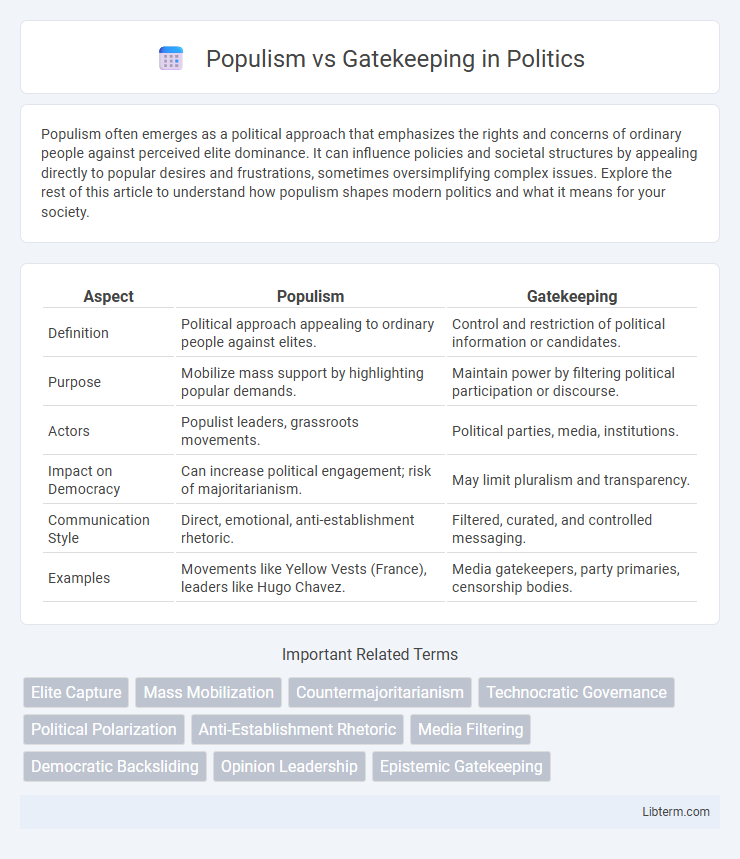Populism often emerges as a political approach that emphasizes the rights and concerns of ordinary people against perceived elite dominance. It can influence policies and societal structures by appealing directly to popular desires and frustrations, sometimes oversimplifying complex issues. Explore the rest of this article to understand how populism shapes modern politics and what it means for your society.
Table of Comparison
| Aspect | Populism | Gatekeeping |
|---|---|---|
| Definition | Political approach appealing to ordinary people against elites. | Control and restriction of political information or candidates. |
| Purpose | Mobilize mass support by highlighting popular demands. | Maintain power by filtering political participation or discourse. |
| Actors | Populist leaders, grassroots movements. | Political parties, media, institutions. |
| Impact on Democracy | Can increase political engagement; risk of majoritarianism. | May limit pluralism and transparency. |
| Communication Style | Direct, emotional, anti-establishment rhetoric. | Filtered, curated, and controlled messaging. |
| Examples | Movements like Yellow Vests (France), leaders like Hugo Chavez. | Media gatekeepers, party primaries, censorship bodies. |
Understanding Populism: Origins and Characteristics
Populism originates from political movements emphasizing the divide between "the people" and "the elite," often emerging in response to perceived social or economic inequalities. Key characteristics include anti-establishment rhetoric, charismatic leadership, and appeals to direct democracy to bypass traditional gatekeeping institutions. Understanding populism requires analyzing its role in challenging existing power structures and its impact on media, political discourse, and public participation.
Gatekeeping Defined: Roles in Society and Media
Gatekeeping refers to the process by which information is filtered, controlled, and disseminated by key entities such as media organizations, journalists, and institutional authorities, shaping public perception and discourse. In society and media, gatekeepers decide which news stories, cultural narratives, or ideas gain visibility, thereby influencing social norms, political agendas, and access to power. This filtering mechanism contrasts with populism's emphasis on direct communication and bypassing traditional intermediaries, highlighting gatekeeping's role in maintaining established hierarchies and controlling information flow.
Core Differences Between Populism and Gatekeeping
Populism centers on appealing directly to the general population by challenging elite control and promoting the voice of the "common people," while gatekeeping involves controlling access to resources, information, or opportunities by established authorities or institutions. Core differences lie in populism's emphasis on mobilizing mass support against perceived exclusion by elites, contrasted with gatekeeping's focus on maintaining standards and filtering who gets access or influence. Populism drives political or social movements by rallying collective identity, whereas gatekeeping functions as a regulatory mechanism within organizations or systems to preserve order and quality.
Historical Contexts: Populist Movements vs Established Elites
Populist movements often emerge during periods of perceived social or economic crisis, rallying against established elites who are seen as disconnected from the demands of ordinary people. Historical examples include the late 19th-century People's Party in the United States and early 20th-century European populist movements, which challenged entrenched political and economic gatekeepers controlling access to power. These movements emphasize direct representation and seek to bypass traditional elite-controlled institutions, contrasting sharply with gatekeeping mechanisms designed to maintain status quo authority and restrict political participation.
The Impact of Populism on Democratic Institutions
Populism often challenges democratic institutions by undermining established norms and concentrating power in the hands of charismatic leaders, which can erode checks and balances. It typically appeals directly to the "common people," bypassing traditional gatekeeping mechanisms such as independent media and judicial oversight, leading to weakened institutional accountability. This dynamic threatens the stability and integrity of democratic governance by fostering polarization and reducing institutional transparency.
Gatekeeping in the Digital Age: Challenges and Transformations
Gatekeeping in the digital age faces challenges such as the rapid spread of misinformation and the decentralization of information sources on social media platforms. Traditional gatekeepers like editors and journalists must adapt by employing advanced algorithms and fact-checking tools to maintain content quality and reliability. The transformation includes a shift towards user-generated content moderation and the need for transparent editorial policies to balance freedom of expression with responsible information dissemination.
Populism’s Appeal: Connection with the Masses
Populism's appeal lies in its direct connection with the masses, often bypassing traditional gatekeepers like mainstream media and political elites. By emphasizing the voice and concerns of ordinary people, populist movements foster a sense of inclusion and empowerment. This grassroots engagement challenges established power structures and resonates strongly during periods of social or economic unrest.
Gatekeeping Criticisms: Accusations of Bias and Elitism
Gatekeeping faces robust criticisms centered on accusations of bias and elitism, as gatekeepers often control access to information, cultural spaces, or political power, potentially reinforcing dominant ideologies and marginalizing dissenting voices. Critics argue that this selective control perpetuates inequality by privileging certain groups while excluding others, fostering a sense of disenfranchisement among broader populations. Such dynamics challenge the fairness and transparency of institutional decision-making processes, fueling skepticism about the impartiality of cultural, media, and political gatekeepers.
Case Studies: Populist Leaders vs Traditional Gatekeepers
Populist leaders such as Donald Trump and Jair Bolsonaro challenge traditional gatekeepers like established political parties and media institutions by directly appealing to the public through social media and rallies, bypassing conventional channels of power. Case studies reveal that populists often leverage grievances and anti-elitist rhetoric to mobilize mass support, contrasting with gatekeepers who maintain control through policy expertise and institutional authority. This dynamic reshapes political landscapes by disrupting the balance between popular demands and established norms in democratic governance.
Navigating the Future: Balancing Populism and Gatekeeping
Navigating the future requires a careful balance between populism, which empowers broad public participation, and gatekeeping, which ensures quality control and expertise in decision-making. Emphasizing transparency and inclusiveness while maintaining rigorous standards enables societies to respond effectively to complex challenges. Striking this balance fosters resilient democratic systems that adapt to evolving social and political landscapes.
Populism Infographic

 libterm.com
libterm.com